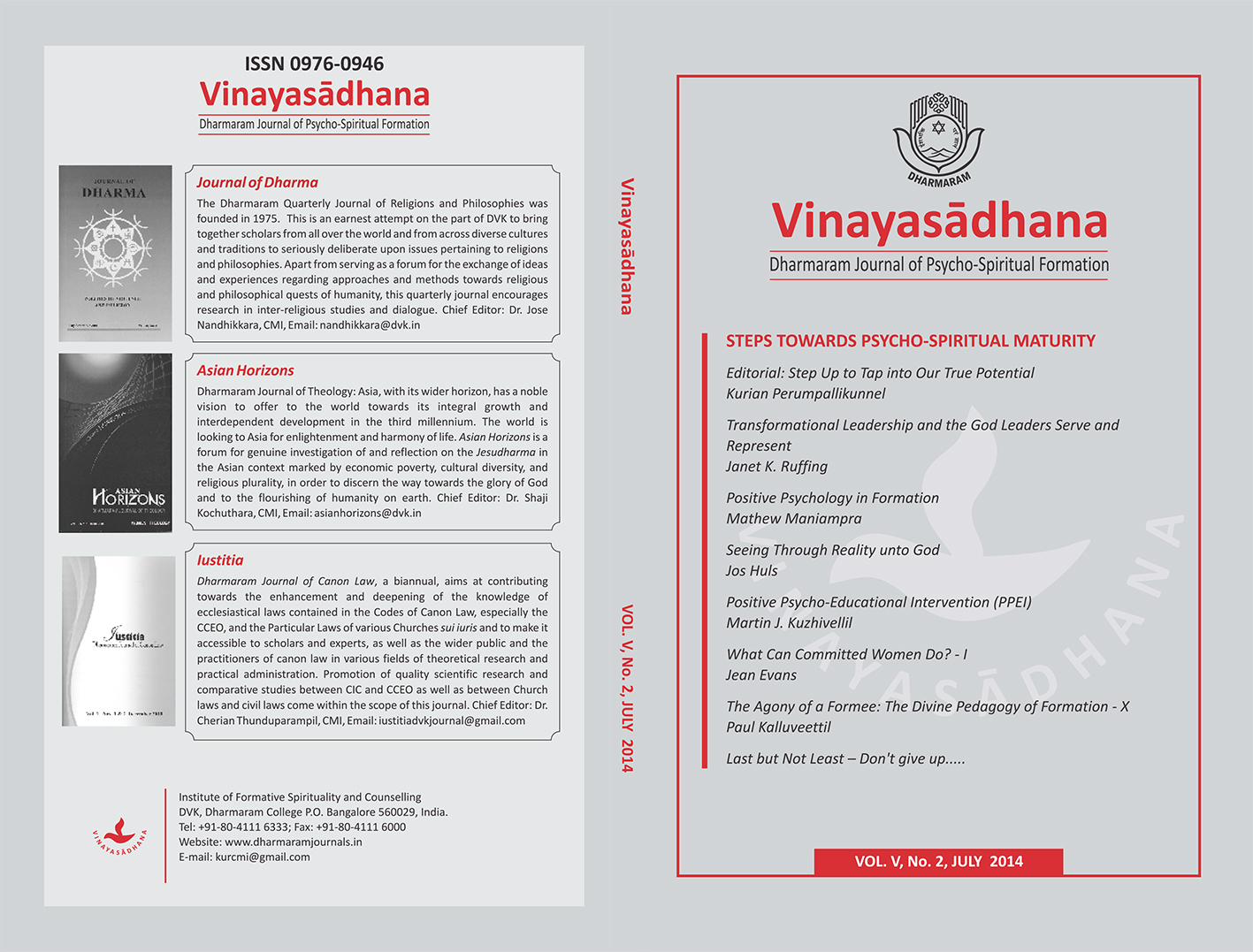Positive Psycho-Educational Intervention (PPEI)
Motivation and Alleviation of Depressive Symptoms
Keywords:
Positive Psycho-Educational Intervention, Motivation, Depressive Symptoms, Psycho-education, PPEIAbstract
India with more than a billion residents has the second largest education system in the world. But it is alarming that the dropout problem is very pervasive in the Indian educational contexts. Many children who enter school are unable to complete their education and multiple factors are responsible for students dropping out of school. Therefore, this study is aimed to develop and assess the effectiveness of the positive psycho-educational intervention (PPEI) in enhancing student engagement, motivation and alleviation of depressive symptoms among the dropouts in West Bengal, India. A total of 68 dropout boys from urban areas were randomly assigned both in control and experimental groups. The statistical analysis between the pre-test and post-test scores of the experimental group showed significant difference (p=.000) and its post-test scores indicated significant increase in student engagement and motivation and significant decrease in the depressive symptoms. It indicates that the Psycho-education focused positive intervention Program (PPEI) was effective for the participants.
References
Anupreet S 1999. Education Department Clueless on Dropout rate. Indian Express, 1999, 30th July.
Appleton, J. J., Christenson, S. L., Kim, D., & Reschly, A. L. (2006). Measuring cognitive and psychological engagement: Validation of the Student Engagement Instrument. Journal of School Psychology, 44, 427 – 445.
Arun S 2000. Why India has 50 million school drop-outs? The Times of India, 2000, 15th December.
Bandura, A. (1986). Social foundations of thought and action: A social cognitive theory. Englewood Cliffs, NJ7 Prentice Hall
Chawla, K.S. (1997). Depression among kids. The Tribune, October, p. 17.
Cheney, G.R., Ruzzi, B.B., & Muralidharan, K. (2006) A profile of the Indian education system. Paper prepared or the new commission of the Skills on the American work force.
Christenson, S. L., & Thurlow, M. L. (2004). School dropouts: prevention considerations, interventions, and challenges. Current Directions in Psychological Science, 13(1), 36-39.
Creed, P. A., Muller, J., & Patton, W. (2003). Leaving high school: The influence and consequences for psychological well-being and career-related confidence. Journal of Adolescence, 26, 295–311.
Entwisle, D. R., Alexander, K. L., & Olson, L. S. (2005). First grade and educational attainment by age 22: a new story. American Journal of Sociology, 110 1458e1502.
Finn, J. D. (1989). Withdrawing from school. Review of Educational Research, 59, 117– 142.
Fredrickson BL, The Value of Positive Emotions, Am Sci. 2003, 91:330-335
Fredrickson, B. L. 1998. What good are positive emotions? Review of General Psychology
Fredrickson, B. L. 2000. Cultivating positive emotions to optimize health and well-being. Prevention and Treatment 3.
Govindaraju R,& Venkatesan,S (2010). A study on School- Dropouts in rural settings, J Psychology, 1 (1): 47-53 (2010)
Heckman, J. J. (2006). Skill formation and the economics of investing in disadvantaged children. Science, 312, 1900e1902. Heckman, J. J. (2006). Skill formation and the economics of investing in disadvantaged children. Science, 312, 1900e1902.
Kaplan, D. S., Damphousse, K. R., & Kaplan, H. B. (1994). Mental health implications of not graduating from high school. Journal of Experimental Education, 63(2), 105–123.
Kasen, S., Johnson, J., & Cohen, P. (1990). The impact of school emotional climate on student psychopathology. Journal of Abnormal Child Psychology, 18, 165–177.
Kortering, L. J., Hess, R. S., & Braziel, P. M. (1997). School dropout. In G. G. Bear, K. M Minke, & A. Thomas (Eds.), Children ‘s needs II: Development, problems, and alternatives (pp. 511–521). Bethesda, MD: National Association of School Psychologists.
Kripalani, M (2005) Bloomberg Business week Magazine, January 31, 2005
Legault, L, Anawati, M, Flynn, R, (2006) Factors favouring Psychological resilience among fostered young people. Children and Youth services review, 28(2006), 1024- 1038
Liem, J. H., Lustig, K., Dillon, C. (2010). Depressive Symptoms and life satisfaction among Emerging Adults: A comparison of High school Dropouts and Graduates. Journal of adult development, 17: 33-43
Martin, A. J. (2003). The student motivation scale: further testing of an instrument that measures school students ‘ motivation. Australian Journal of Education, 47(1), 88–106
Martin, A. J. (2007). Examining a multidimensional model of student motivation and engagement using a construct validation approach. British Journal of Educational Psychology, 77(2), 413–440.
Martin, A. J. (2011a). The motivation and Engagement Scale. Sydney, Australia: Lifelong Achievement group. (www.Lifelongachievement.com)
Myers, & Christine Hansen, (2006). Experimental psychology (6th Ed). USA: Wadsworth
Okumu, Ibrahim M., Nakajjo, Alex, & Isoke, Doreen, 2008. “Socioeconomic Determinants of Primary School Dropout: The Logistic Model Analysis, Economic Policy Research Center, Makerere University. Online at http://mpra.ub.uni-muenchen.de/7851/ MPRA Paper No. 7851, posted 20. March 2008
Peterson, C (2006) A Primer in positive Psychology, New York, Oxford University Press, 2006
Rumberger, R. W., & Lamb, S. P. (2003). The early employment and further education experiences of high school dropouts: a comparative study of the United States and Australia. Economics of Education Review, 22, 353e366.
Sajjad, H, Iqbal, M, Siddiqui, M.A, Siddiqui, L (2012) Socio-Economic Determinants of Primary School Dropout: Evidence from South East Delhi, India European Journal of Social Sciences ISSN 1450-2267 Vol.30 No.3 (2012), pp. 391-399
Sharma, R., Sharma, S., and Nagar, S, 2007. “Extent of Female School Drop outs in Kangra District of Himachal Pradesh”. Journal of Social Science, 15(3): 201-204
Strober, M., Green, J., Carlson, G. (1981). Utility of the Beck Depression Inventory with psychiatrically hospitalized adolescents. Journal of Clinical and Consulting Psychology, 49, 482-483.
Tinto, V. (1975). Dropout from higher education: a theoretical synthesis of recent research. Review of Educational Research, 45(1), 89e125.
Zimmer-Gembeck, M. J. (2006). Relationships at school and stage environment fit as resources for adolescent engagement and achievement. Journal of Adolescence, 29, 911–933


